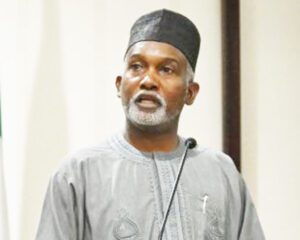
Maritime activities: CPPE Knocks NBS over poor data analysis
…Shippers Council decries low technological advancement in port operations
The Centre for the Promotion of Private Enterprises (CPPE) has once again criticised the National Bureau of Statistics (NBS) for its failure to provide comprehensive and essential data on the Marine and Blue Economy subsector of Nigeria’s shipping industry.
The CPPE expressed concern that the lack of detailed analysis and operational statistics is limiting the evaluation of the sector’s performance, particularly in relation to local content and the activities of indigenous operators.
The CEO of CPPE, Dr. Muda Yusuf, raised these concerns while speaking at the 2024 annual seminar for maritime journalists in Lagos. He lamented that the NBS has not provided significant data on maritime activities, despite the sector’s crucial contribution to Nigeria’s economy.
Yusuf, a former President of the Lagos Chamber of Commerce and Industry (LCCI), called for more attention from the NBS to the maritime sector, especially considering its impact on Nigeria’s Gross Domestic Product (GDP).
According to Yusuf, the data currently available does not accurately reflect the maritime sector’s contribution to GDP, and he urged the NBS to improve its data collection and analysis efforts for better assessment of the sector’s performance. He also pointed out the continuing foreign dominance in the maritime industry, stressing that the current regulations, particularly the Cabbage Act, have failed to adequately protect local content.
Yusuf further argued that no country would tolerate foreign dominance in its maritime operations and expressed concern that indigenous operators were being sidelined, particularly in key sub-sectors such as freight forwarding, shipping, terminal operations, and logistics.
Earlier in the seminar, Pius Akutah, the Executive Secretary of the Nigerian Shippers’ Council (NSC), also highlighted significant challenges facing the maritime industry. He noted that the adoption of modern technology in port operations remains low, hindering efficiency and transparency.
Akutah, who was represented by the Director of Special Duties at the NSC, Mustapha Zubairu, explained that high tariffs, port charges, and inefficiencies at Nigerian ports are contributing to the rising cost of doing business.
While the NSC is responsible for overseeing tariff structures and pricing, Akutah emphasised that balancing the interests of port operators, shippers, and the government to make the ports more competitive remains a challenge.
He also pointed out that the Nigerian Shippers’ Council’s status as the port economic regulator, granted by the federal government in 2015, has not been fully formalised due to the lack of legislative backing. Therefore, Akutah stressed the need for the passage of the Nigerian Shipping and Port Economic Regulatory Agency Bill 2023, which seeks to repeal the Nigerian Shippers’ Council Act and establish a more formal regulatory framework for Nigeria’s ports.
Akutah further highlighted the issue of infrastructure deficiencies, such as outdated cargo handling equipment, inadequate road networks, and insufficient storage facilities at the ports. Although the NSC can regulate the economic activities in the sector, it has limited control over the physical infrastructure, which falls under the purview of other government agencies. He stressed that these infrastructural challenges constrain the NSC’s ability to drive reforms and improve port operations.
The NSC’s ability to collaborate with other stakeholders in the maritime sector is also a concern. Akutah pointed out that effective port regulation requires close coordination between the NSC, the Nigerian Ports Authority (NPA), customs, terminal operators, shipping companies, and other stakeholders.
However, there is often a lack of synchronisation among these entities, leading to inefficiencies, conflicting policies, and a fragmented regulatory environment. Akutah called for better communication and collaboration between all parties to ensure smoother port operations.
Addressing issues such as congestion and delays, Akutah noted that despite efforts to streamline operations, Nigerian ports continue to face inefficiencies. While the NSC is not directly responsible for managing port traffic, it plays a key role in improving port competitiveness by addressing delays, demurrage charges, and other inefficiencies arising from congestion.
Akutah also highlighted the challenges posed by the slow adoption of technology in port operations, which hinders operational efficiency and transparency. He mentioned that while the NSC is tasked with promoting the digitalisation of port processes, challenges such as inadequate internet infrastructure, resistance to change, and a lack of skilled personnel are impeding progress in this area.
Security challenges, including cargo theft, piracy, and general lawlessness at Nigerian ports, were also cited as factors that increase shipping costs and undermine port operations.
In addition, Akutah raised concerns about corruption among port officials and stakeholders, noting that illegal fees, bribery, and rent-seeking behaviour complicate the NSC’s regulatory functions and undermine efforts at reform.
The seminar’s convenor, Sesan Onileimo, CEO of First Mediacon Network Limited, shared the theme of the event, “The Nigerian Shippers’ Council in Transition: Issues, Prospects, Challenges.”
Onileimo explained that the theme was chosen to offer maritime journalists and content owners an opportunity to gain insights into the emerging changes at the NSC. He noted that this seminar, which has been held annually for the past nine years, provides an important platform for addressing critical issues in the Nigerian maritime industry.
Onileimo also expressed gratitude to the previous leadership of the NSC, particularly the then Executive Secretary Hassan Bello, for their support of capacity building for maritime journalists. He highlighted that the annual seminar has now become a key performance indicator (KPI) for the NSC’s Public Relations Department, underlining the importance of the event in fostering dialogue within the industry.
Onileimo praised the ongoing efforts to enact the Nigerian Shipping and Port Economic Regulatory Agency Bill 2023, which is currently in its final stages. He expressed optimism that the bill would bring about transformative changes in Nigeria’s shipping and port sectors, making it a game-changer for the industry.




